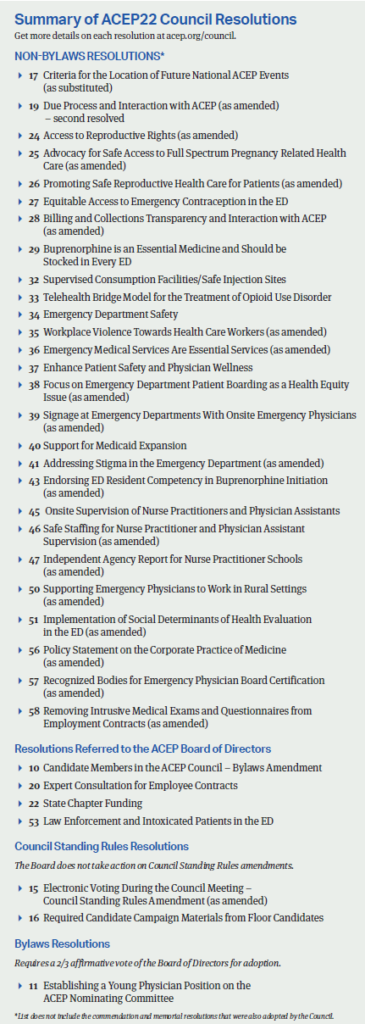
ACEP’s EM Workforce Section submitted a resolution to address concerns about the wide variation and quality in nurse practitioner education. “Resolution 47: Independent Agency Report for Nurse Practitioner Schools” called for ACEP to “work with the American Medical Association to provide recommendations for nurse practitioner education reform to improve the quality and standards of nurse practitioner training for the purpose of improving physician-led patient care.” Asynchronous and live testimony was mixed, with commenters discussing alternative approaches such as a minimum number of clinical hours and/or standardized testing. After much discussion, an amended resolution was adopted.
Resolution author and EM Workforce Section leader Deborah Fletcher, MD, FACEP, said hearing from the many perspectives of ACEP Councillors is a learning opportunity. “There are so many serving in the Council who have been doing this longer than I have, and I appreciate the advice. I might get carried away at times and look for immediate results (the ED physician in me!), but it is great to have those who understand the process and how to work for the best outcome long term,” she said.
Law Enforcement and Intoxicated ED Patients
The past few years of ACEP Council meetings have seen resolutions related to the relationship between law enforcement and the emergency department or EMS, and this year was no different. Elizabeth Barrall Werley, MD, FACEP, and Jennifer Savino, DO, FACEP, helped lead a team from the Pennsylvania College of Emergency Physicians that submitted “Resolution 53: Law Enforcement and Intoxicated Patients in the Emergency Department” to help combat workplace violence in the emergency department (ED). Resolution 53 called on ACEP to investigate alternative care models to evaluate patients in police custody, such as telehealth, to determine necessity of an in-person evaluation, and to encourage law enforcement to stay with any patient they choose to bring to the ED who poses a risk to the safety of themself or others until a disposition has been determined or the physician determines assistance is no longer needed.
Dr. Werley was inspired to write the resolution by a scary encounter she had years ago in her ED when she was in her second trimester with her first child. Law enforcement left an intoxicated patient with her because he seemed to be in control. After they left, he physically assaulted her. She ultimately pressed charges and testified in court. “Fast forward 10 years later, and I attended ACEP’s 2022 Leadership & Advocacy Conference where we lobbied for protection from violence against health care workers. So, my personal encounter from over a decade before was fresh in my head all over again [as I proposed this resolution].”





No Responses to “ACEP Council Debates Scope of Practice, Access to Care, Safe Injection Sites, and More”